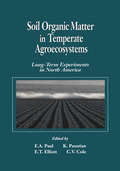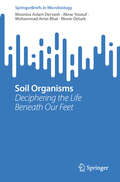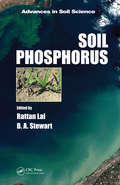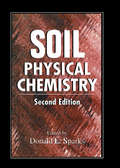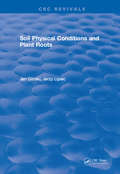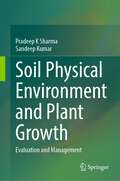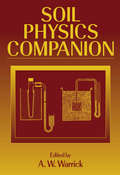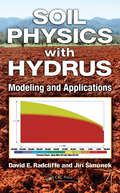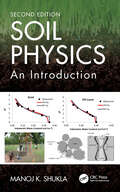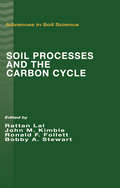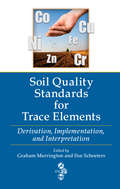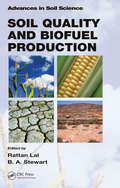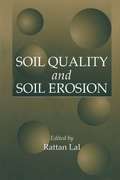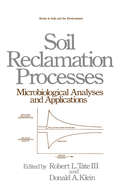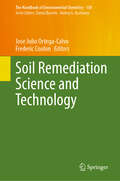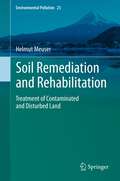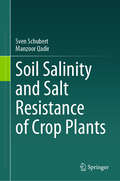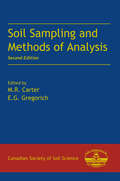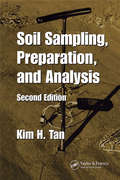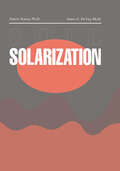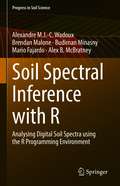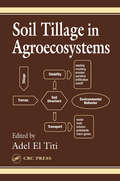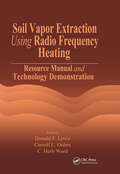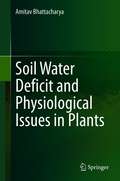- Table View
- List View
Soil Organic Matter in Temperate AgroecosystemsLong Term Experiments in North America
by Eldor A. Paul Keith H. Paustian E. T. Elliott C. Vernon ColeThe presence - or absence - of soil organic matter (SOM) has important implications for agricultural productivity. It could also have significant implications for global climate due to its role as a source/sink of carbon. Therefore, it is important to understand the issues related to the accumulation or loss of SOM, to use what we have learned from experiments to make sound decisions about soil and crop management, and to test models and future concepts concerning SOM management. A database is included with the book, presenting tabular data for 34 sites in North America. Soil Organic Matter in Temperate Agroecosystems discusses all of these issues and more, answering such questions as:
Soil Organisms: Deciphering the Life Beneath Our Feet (SpringerBriefs in Microbiology)
by Munir Ozturk Abrar Yousuf Moonisa Aslam Dervash Mohammad Amin BhatSoil biota is an important and fundamental part of terrestrial ecology. The soil organisms include all those life forms which pass significant proportion of their life within a soil profile. The range of organisms may vary from microscopic entities to a macro level organisms. These organisms are the hidden beauties which take up the task of food chain regulation, organic matter decomposition, and nutrient enrichment of soil. Soil organisms can be grouped into three classes viz; chemical engineers (bacteria,fungi and protozoans), biological regulators (small soil invertebrates like nematodes and mesofauna) and ecosystem engineers (large soil invertebrates and small mammals). These creatures are mainly regulated by certain physical and biological factors. The physicochemical characteristics of soil can determine its biological diversity which influences the regulatory services in an ecosystem. This book showcases the mechanisms of biological dynamics at micro, meso and macro scales of the soil organisms. The introductory chapters of this book focus on understanding the faunistic diversity and its significance in soil, bioindicators in assessment of soil quality, consequences of various stressors on soil, highlighting the eves and odds associated with agricultural industry vis-à-vis environmental pollution and the possible influences on soil biota. Remaining chapters focus on the fungal internet, ecosystem cybernetics, and the potential remedial technologies for soil conservation, and novel remediation strategies to deal with degraded soils.
Soil Phosphorus (Advances in Soil Science)
by Rattan Lal B. A. StewartPhosphorus is an essential plant nutrient, but global population growth has dramatically reduced the availability of phosphorus fertilizer resources. Despite this scarcity, there remain numerous problems associated with the excessive and inappropriate use of phosphorus leading to non-point source pollution and eutrophication of natural waters. Identifying appropriate systems for managing soil phosphorus and reducing the risks of eutrophication are needed to minimize the environmental risks. This book focuses on the availability and recycling of phosphorus; regulatory and policy issues of sustainable phosphorus use; and water quality management in agroecosystems pertaining to phosphorus. Sections are dedicated to global phosphorus reserves; cycling and pathways of phosphorus; phosphorus in agriculture; human dimensions and policy intervention; and research and development priorities. Phosphorus is a finite but crucial resource and is an essential element to all life. Sub-optimal availability and nutrient imbalance in the root zone can adversely impact plant growth, and the quality of food and feed grown on these soils. However, the proven reserves of phosphorus can hardly be adequate for a few centuries only. Yet, its misuse and mismanagement has caused severe problems of eutrophication of water and pollution of the environment. Thus, judicious management of soil phosphorus is essential. This volume is specifically devoted to availability and recycling of phosphorus, regulatory/policy issues of sustainable use of phosphorus, and management in agroecosystems in the context of maximizing the use efficiency and minimizing the environmental risks of water quality.
Soil Physical Chemistry
by Donald L. SparksSoil Physical Chemistry, Second Edition takes up where the last edition left off. With comprehensive and contemporary discussions on equilibrium and kinetic aspects of major soil chemical process and reactions this excellent text/reference presents new chapters on precipitation/dissolution, modeling of adsorption reactions at the mineral/water interface, and the chemistry of humic substances. An emphasis is placed on understanding soil chemical reactions from a microscopic point of view and rigorous theoretical developments such as the use of modern in situ surface chemical probes such as x-ray adsorption fine structure (XAFS), Fournier transform infrared (FTIR) spectroscopies, and scanning probe microscopies (SPM) are discussed.
Soil Physical Conditions and Plant Roots
by J. GlinskiThis book is a specialized monograph on soil physical conditions and root-system relations. It attempts to explain the importance of physical properties of soil by showing how they affect root growth and functions; and on the other hand, how roots themselves change their environment. Emphasis is placed on the interactive effects of soil physical factors. An attempt has been made to analyze the possibilities of the root system‘s modification by both soil and plant management.The book is addressed to research workers and advanced students in soil and plant sciences and may also be of interest to agronomists and related specialists.
Soil Physical Environment and Plant Growth: Evaluation and Management
by Sandeep Kumar Pradeep K SharmaThis textbook on the applied aspects of soil physics covers introduction to soil physical properties and processes, and their evaluation and management in relation to plant growth. It distinguishes physical properties that directly influence plant growth from those that indirectly affect agricultural productivity. Chapters are also devoted to the concept of soil health and the role of soil physics on preservation of soil health and environmental quality. As such, this book fills a unique knowledge gap for agriculture and agronomy students, course directors as well as field professionals.
Soil Physics Companion
by A. W. WarrickAn authoritative reference on soil physics, Soil Physics Companion is lavishly illustrated with graphs, charts, line drawings, and equations. The book provides a valuable source of material and reference for most contemporary topics of soil physics and the vadose zone - arguably the most comprehensive volume available. In addition to being a reliab
Soil Physics with HYDRUS: Modeling and Applications
by David E. Radcliffe Jiri SimunekNumerical models have become much more efficient, making their application to problems increasingly widespread. User-friendly interfaces make the setup of a model much easier and more intuitive while increased computer speed can solve difficult problems in a matter of minutes. Co-authored by the software’s creator, Dr. Jirka Šimůnek, Soil Physics with HYDRUS: Modeling and Applications demonstrates one- and two-dimensional simulations and computer animations of numerical models using the HYDRUS software. Classroom-tested at the University of Georgia by Dr. David Radcliffe, this volume includes numerous examples and homework problems. It provides students with access to the HYDRUS-1D program as well as the Rosetta Module, which contains large volumes of information on the hydraulic properties of soils. The authors use HYDRUS-1D for problems that demonstrate infiltration, evaporation, and percolation of water through soils of different textures and layered soils. They also use it to show heat flow and solute transport in these systems, including the effect of physical and chemical nonequilibrium conditions. The book includes examples of two-dimensional flow in fields, hillslopes, boreholes, and capillary fringes using HYDRUS (2D/3D). It demonstrates the use of two other software packages, RETC and STANMOD, that complement the HYDRUS series. Hands-on use of the windows-based codes has proven extremely effective when learning the principles of water and solute movement, even for users with very little direct knowledge of soil physics and related disciplines and with limited mathematical expertise. Suitable for teaching an undergraduate or lower level graduate course in soil physics or vadose zone hydrology, the text can also be used for self-study on how to use the HYDRUS models. With the information in this book, you can run models for different scenarios and with different parameters, and thus gain a better understanding of the physics of water flow and contaminant transport.
Soil Physics: An Introduction, Second Edition
by Manoj K. ShuklaDesigned for undergraduate and graduate students interested in learning basic soil physics and its application to environment, soil health, water quality and productivity, this book provides readers with a clear coverage of the basic principles of water and solute transport through vadose zone, the theory behind transport and step-by-step guidance on how to use current computer models in the public domain along with soil erosion and contaminant remediation. Students will develop a deeper understanding of the fundamental processes within the soil profile that control water infiltration, redistribution, evapotranspiration, drainage, and erosion. The updated second edition features one new chapter, highlighting new problems, new computer models, and remediation. Features Serves as the most up-to-date textbook on soil physics available. Includes one new chapter and many new numerical examples. Offers mathematical descriptions supported by simplified explanations. Provides case studies and step-by-step guidance on how to use public domain computer models. Covers all principles and processes in an easy-to-understand format with numerous illustrations and sample problems. Students studying in the fields of Soil Science, Environment Science, Natural Resources, Agriculture Engineering, Civil Engineering, Environmental Engineering, Range Sciences, Horticulture, Crop Sciences, and Forestry, will find this book provides a solid foundation for their studies. Professionals, researchers, academicians, and companies working in fields related to Environmental Science, Soil Physics, Hydrology, and Irrigation, will find this book is a great reference tool as it is the most up to date in its field.
Soil Processes and the Carbon Cycle (Advances in Soil Science #11)
by Rattan LalJohn M. KimbleRonald F. FollettBobby and A. StewartWorld soils contain about 1500 gigatons of organic carbon. This large carbon reserve can increase atmospheric concentrations of CO2 by soil misuse or mismanagement, or it can reverse the 'greenhouse' effect by judicious land use and proper soil management. Soil Processes and the Carbon Cycle describes soil processes and their effects on the global carbon cycle while relating soil properties to soil quality and potential and actual carbon reserves in the soil. In addition, this book deals with modeling the carbon cycle in soil, and with methods of soil carbon determinations.
Soil Quality Standards for Trace Elements: Derivation, Implementation, and Interpretation
by Graham Merrington Ilse SchoetersA comprehensive and practical overview of the state of the science, Soil Quality Standards for Trace Elements: Derivation, Implementation, and Interpretation addresses the derivation of soil quality standards for trace elements and the implementation of these standards within regulatory and risk assessment frameworks. Forty experts from 11 countrie
Soil Quality and Biofuel Production (Advances in Soil Science)
by Rattan Lal B. A. StewartFrom its humble beginning in the late 19th centurywhen Henry Ford's first car was designed to run on ethanolbiofuel production has been on the rise with more than 26 billion liters produced in the U.S. in 2007. Ethanol made from biomass (rather than grains) holds great promise, including numerous economic and environmental benefits. However, the ad
Soil Quality and Soil Erosion
by Rattan LalThis work examines the issue of accelerated soil erosion, which has become an increasingly serious concern in the twentieth century. Aspects considered include on-site impact of erosion; application of soil science to problems of non-agricultural uses of soil, such as mineland restoration, urban uses and disposal of urban wastes; soil contamination and pollution by industrial activities; and athletic and recreational uses of soil. Soil Quality and Soil Erosion will be a useful text for soil scientists, agronomists, foresters, and environmental scientists as we enter the next century.
Soil Reclamation Processes Microbiological Analyses and Applications
by Robert L. Tate Donald A. KleinThis book provides an assessment of the understanding of soil microbiology and biochemistry as part of reclamation processes. It attempts to assemble more specialized literature on reclamation, where application of microbiological concepts has provided the understanding of the process.
Soil Remediation Science and Technology (The Handbook of Environmental Chemistry #130)
by Jose Julio Ortega-Calvo Frederic CoulonThis book reviews the latest advances in soil remediation and is an authoritative account of the environmental chemistry, microbiology, ecotoxicology, and regulation policies of soil pollution. The book also discusses possible pathways for innovation, by incorporating state-of-the-art knowledge on sustainability, nature-based solutions, and socio-economical aspects. Divided into four parts, the book opens with an overview of the legal context and policy economy of soil pollution and remediation. The management of contaminated soils has a high cost and, although much of this cost is borne by companies, there is also high public spending. The strategic value of soil, the extensive costs associated with the remediation of many polluted sites throughout the World, and the current crisis demand for new solutions to soil remediation that are addressed in the following parts of the book. In this book, readers will find a comprehensive description of several remediation strategies by different pollution sources, nature-based solutions, and physicochemical methods for the remediation of contaminated soils. Particular attention is given to contaminated soils from industrial activities, urban settings, mining, and military activities. In the final chapter of the book, the editors present a perspective of the field, research trends and needs. Given its breadth, this book appeals to regulators, industrial scientists, and scholars alike.
Soil Remediation and Rehabilitation
by Helmut MeuserThis book provides a comprehensive overview of remediation and rehabilitation techniques and strategies for contaminated and anthropogenically disturbed land. Rehabilitation approaches in the urban environment, such as brownfield redevelopment and urban mining, are discussed. In relation to contaminated land, techniques for soil containment and decontamination of soil, soil vapour and groundwater are comprehensively and systematically presented. Complicated treatment techniques are schematically depicted and can be readily understood. Agricultural, silvicultural and environmentally sustainable rehabilitation strategies for reclaiming disturbed land/terrain in former mining or natural-resource extraction areas, such as open-cast mines, quarries, harvested peatlands, and subsided mining terrain (sinkholes), are introduced. This book will be a useful tool for students, researchers, private consultants and public authorities engaged in the treatment of contaminated or disturbed land.
Soil Salinity and Salt Resistance of Crop Plants
by Manzoor Qadir Sven SchubertThe book combines knowledge about salinity problems from soil science and plant science and presents an in-depth treatment of the current scientific findings to enable plant production on saline soils. It discusses soil parameters in the context of the development of plants with salt resistance as a multigenic trait. An integrated view helps to comprehend the complicated metabolic and biophysical aspects involved in salt resistance. Findings in recent years promise to promote salt resistance significantly. The possibility to cultivate plants on so far barren land is of utmost importance with regard to a fast-growing world population and an increasing need for food, feed, and regrowing resources under particular consideration of environmental protection.
Soil Sampling and Methods of Analysis
by E. G. Gregorich M. R. CarterThoroughly updated and revised, this second edition of the bestselling Soil Sampling and Methods of Analysis presents several new chapters in the areas of biological and physical analysis and soil sampling. Reflecting the burgeoning interest in soil ecology, new contributions describe the growing number and assortment of new microbiological
Soil Sampling, Preparation, and Analysis (Books in Soils, Plants, and the Environment)
by Kim H. TanThis second edition of the popular Soil Sampling, Preparation, and Analysis provides a hands-on guide to the methods most commonly used in modern soil laboratories around the world, illustrating the methods with actual results. Divided into three sections, the book covers principles of soil sampling and sources of errors and variability of results, common procedures for extraction and analysis in soil plant testing, and instrumentation. The author added three new chapters on soil and plant test methods, electron microscopy, and nuclear magnetic resonance. He has extensively revised, updated, and expanded all of the other chapters to reflect recent advances and shifting interests in the field.
Soil Solarization
by Jaacov Katan James E. DeVaySoil Solarization describes the principles and technology of soil solarization and the use of soil solarization for different crops and cropping systems. The book evaluates and interprets the extensive amount of literature available on soil solarization in relation to climatic effects and changes in populations of soil-borne microorganisms and weeds. It also compares the advantages and disadvantages of soil solarization with other methods of soil disinfestation, such as soil steaming and fumigation. Soil Solarization explores the effects of soil solarization, covering such points as biological control, changes in soil chemistry involving mineral elements, as well as other changes, such as soil salinity and soil structure. It is suitable for solarizers, researchers working with soil-borne pathogens and soil microbiology, plant protection experts, and other plant researchers and extension specialists.
Soil Spectral Inference with R: Analysing Digital Soil Spectra using the R Programming Environment (Progress in Soil Science)
by Budiman Minasny Alex B. McBratney Alexandre M.J.-C. Wadoux Brendan Malone Mario FajardoThis book provides a didactic overview of techniques for inferring information from soil spectroscopic data, and the codes in the R programming language for performing such analyses. It is intended for students, researchers and practitioners looking to infer soil information from spectroscopic data, focusing mainly on, but not restricted to, the infrared range of the electromagnetic spectrum. Little prior knowledge of the R programming language or digital soil spectra is required. We work through the steps to process spectroscopic data systematically.
Soil Tillage in Agroecosystems (Advances in Agroecology)
by Adel El TitiBuilding on our knowledge of soil ecology under natural, undisturbed conditions, Soil Tillage in Agroecosystems focuses on how cultivation affects soil and the soil environment. In particular, it highlights how methods of soil tillage can influence soil structure, soil chemical processes, soil borne pathogens, and pest species. Covering the aspects of soil tillage on different taxa, the book concludes with a synthesis of the role of soil tillage in securing a sustainable agricultural environment. It provides the scientific basis for choosing different tillage options to achieve the best possible sustainable base for long-lasting agricultural production.
Soil Vapor Extraction Using Radio Frequency Heating: Resource Manual and Technology Demonstration
by C. H. Ward Carroll L. Oubre Donald F. LoweOne of the most widely used techniques for treating soils contaminated with volatile organic compounds, soil vapor extraction (SVE) can also be applied to semi-volatile organic compounds (SVOCs) if the soil is heated, by applying electromagnetic energy in the radio frequency (FR) range, to increase the vapor pressure of the contaminants. Although RF-SVE systems used in previous field demonstrations have had varying degrees of success, questions remain concerning its viability and cost-effectiveness.Soil Vapor Extraction Using Radio Frequency Heating: Resource Manual and Technology Demonstration covers detailed scientific and engineering information that answers these questions. The book includes the necessary databases, equations, and example calculations for RF heating. The theoretical and practical information included will facilitate future testing of RF-SVE treatment of soils. Additionally, the book provides information for a full-scale engineering design of potential RF-SVE applications. The authors use this information to examine predicted performance, magnitude of costs, and modifications to the design that may decrease cost. Soil Vapor Extraction Using Radio Frequency Heating: Resource Manual and Technology Demonstration gives an economic analysis of this innovative technology and considers other possible applications for it.Features
Soil Water Deficit and Physiological Issues in Plants
by Amitav BhattacharyaThis book explores the impact of soil water deficiency on various aspects of physiological processes in plants. The book explains the effects under soil water deficit condition such as lowering of plant water content, disturbance in carbon metabolism such in photosynthesis, photorespiration and respiration as well as effects of soil water deficit on nitrogen metabolism. The book also educates the readers about, mineral nutrition under soil water deficit condition and roles of different nutrient to overcome water deficit. Changes in growth and development pattern of plant under soil water deficit condition and effects on growth and development are elaborated. This book is of interest to teachers, researchers, scientists in botany and agriculture. Also the book serves as additional reading material for undergraduate and graduate students of agriculture, forestry, ecology, soil science, and environmental sciences. National and international agricultural scientists, policy makers will also find this to be a useful read.The in depth description of the major physiological issues in plants under soil water deficit that are presented in this book will help breeders tailoring crops for desirable physiological survival traits in the face of increasing soil water deficit. This book is an impactful addition to the library of any faculty members, researchers, agricultural policy planner, post graduate or student studying in plant physiology, biochemistry, microbiology and other subjects related to crop husbandry.
